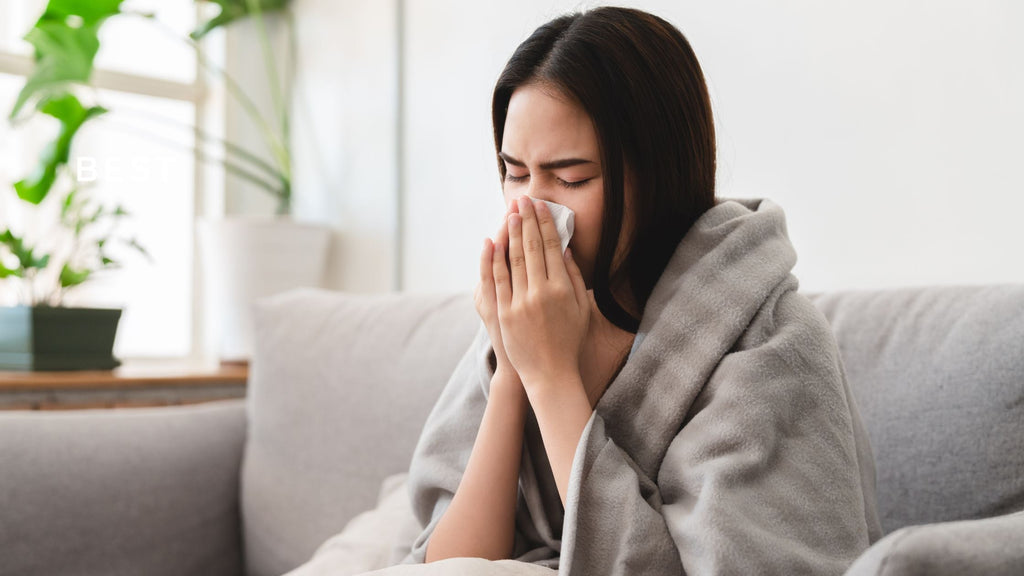How to Reduce Cold and Flu Symptoms with Natural Remedies and Supplements

When infection strikes.. How to Reduce Cold and Flu Symptoms with Natural Remedies and Supplements
You know that feeling, a bit achy, not quite right, blocked nose. As soon as you feel those familiar symptoms, it is time to act. The remedies allicin, black elderberry and vitamin C all that have good evidence for reducing the duration and severity of the common cold when they are taken at the first sign of infection. Other nutrients, including B Vitamins, wholefoods and B12 can help in the reduction of tiredness and fatigue. For specific products, take a look at the Best Five Supplements for Colds, Coughs, and Winter Wellness compiled by the Amaranth Nutritional Therapists.
Here are our top tips for the first sign of a cold or virus:
-
Rest.
It doesn’t come naturally for many of us (including me) but trying to carry on as normal is likely to mean that infections will hang around longer. Rest and sleep help the body to produce immune cells, and your body is trying to fight and infection so you will tired. Taking time out and cancelling plans in the early days, should mean that you are back and fighting fit sooner.
-
Fresh foods, little and often
Food is always the best place to get nutrients from. Vitamin C, garlic, onion and zinc will all be very helpful, and they are easy to incorporate into your diet. Protein is also important as the amino acids that make up protein are amongst the building blocks for those important immune cells.
Vitamin C foods : Kiwi fruit, peppers, green leafy vegetables, strawberries, squash, sweet potato and oranges are all good sources of vitamin C.
Zinc foods : Seafood, red meat, chicken, turkey, seeds, beans and pulses.
Protein foods : Eggs, chicken, fish, meats, beans, lentils, tofu, quinoa, nuts and seeds, avocado, dairy products
Your appetite might be affected and if so try to eat little and often but with as much fresh foods as possible. Smoothies with berries, yoghurt and a protein powder, soups with squash, sweet potato, garlic and onion or chicken soup (fresh not tinned).
-
Hydrate.
Hydration plays a significant role in managing cold and flu symptoms. Fluid helps to maintain blood circulation to transport immune cells, prevent dehydration from fevers, thin mucus to help clear airways and sooth a sore throat. Plain water or herbal teas are best. Yogi do some warming and soothing teas Throat Comfort, Breathe Deep and Immune Support are popular choices. Pukka Elderberry and Echinacea is another option.
-
Very gentle activity.
Depending on the severity of infection, after a few days, a gentle walk and fresh air may do you a world of good. It should improve your mood and boost your energy as long as. Do listen to your body though, if you feel fatigued when you go out, that is a sign that you still need to rest.
-
Supplement.
There is good evidence for Vitamin C, Allicin and Black Elderberry when taken at the first signs of infection. The key to these seems to be to take as soon as possible, the sooner you give, the better the results. Also the dosage must be at a level found to be beneficial in research. Read on for more information and if you are looking for specific products then check out the 5 Best Supplements for the Immune System
Traditional Remedies and Supplements to reduce Colds and Flu Symptoms
If you have a cold or flu infection, you will want to reduce the symptoms as quickly as possible to get back to your everyday life. You can read about wonder ingredients or you may have a go to remedy in your house, but what is the truth? Do these remedies work and how much should you take? We have done our research and here we bring you details of the vitamins and remedies that we believe have good evidence for use. Our Nutrition Team are always happy to give you personalised recommendations so please email or book a health review : If you are looking for specific product recommendations you can find these in our Top 5 Supplements for Cold and Flu.
-
Vitamin C
Vitamin C acts on colds in a number of ways. It increases the production and function of specific white blood cells (these make antibodies to target capture and kill viruses), it protects immune cells from oxidative damage, and it can inhibit an enzyme which helps to stop a virus from replicating. Vitamin C works at many levels in the immune systems fight against viruses and is a good allrounder for supporting healthy immunity.
Many studies have shown the benefits. A comprehensive Cochrane review in 2013 concluded that Vitamin C didn’t reduce the number of colds, but it did reduce the severity and duration. This research shows that if the dosage is higher (4g to 8g per day), then the duration is shorter (between 10% and 48% shorter depending on the dosage). 4g to 8g will however seem a lot of Vitamin C for some people and the digestive system may not tolerate this level. Still at lower dosages there has been shown to be a benefit. In a five-day study giving 1g to 1.5g there was a 25% reduction in duration.
-
Garlic or Allicin
Garlic is widely believed to be useful for the common cold. This belief is based on traditional use and some laboratory evidence that garlic has antibacterial and antiviral properties. Like many natural products, more research is required to give detail on the effects and the required dosage. Here at Amaranth, we have however been interested in the research on allicin, which is an active compound from garlic. Allicin is formed when garlic is crushed or chopped, this activates the enzyme alliinase that converts the compound alliin into allicin. One trial randomly assigned 146 participants to either an allicin‐containing garlic capsule (dose unspecified) or a placebo (once daily) for 12 weeks. The trial reported 24 occurrences of the common cold in the garlic intervention group compared with 65 in the placebo group, and fewer days of illness in the garlic group (111 versus 366). Our own experience and that of our customers, is that Allicin really seems to work for us. All of my family take Allicin capsules at the first sign of a virus and over recent years, we have only experienced mild symptoms and a short duration of infection.
-
Black Elderberry
There have been several studies showing black elderberry to reduce the duration of cold and flu symptoms. For example, in double blinded, placebo-controlled trial of 60 patients suffering flu like symptoms, patients received 15 ml of elderberry four times a day for five days. Symptoms were relieved an average of four days earlier and rescue medication was significantly reduced in those taking elderberry syrup. Elderberry appears to have wide ranging beneficial effects in supporting natural immunity including reducing the ability for the virus to take hold through the cell wall and activating the immune system to increase antibodies against the virus and producing inflammatory cytokines. There is some caution about using black elderberry for acute respiratory distress and respiratory favour so please do speak to your health care professional in this instance.
Whilst these are our favourites, they may not be right for everyone, and other options are available. You should always consult with your GP, especially if you have health concerns or are taking medications. The products here are classified as Food Supplements and as such are not intended to diagnose, treat, cure or prevent any disease.
Our friendly team of nutritional therapists can help with more personalised suggestions or provide more information about each of these nutrients and remedies. You can call us 0161 439 9856 or book a FREE appointment with a nutritional therapist to chat in more detail.
Stay Well xx
References
- Sleep and Immune Function https://pmc.ncbi.nlm.nih.gov/articles/PMC3256323/#Sec12
- Zinc and immune function: the biological basis of altered resistance to infection https://pubmed.ncbi.nlm.nih.gov/9701160/
- Vitamin C for Preventing and Treating the Common Cold https://www.cochrane.org/CD000980/ARI_vitamin-c-for-preventing-and-treating-the-common-cold
- Preventing the common cold with a garlic supplement: A double-blind, placebo-controlled survey. https://link.springer.com/article/10.1007/BF02850113
-
Randomized study of the efficacy and safety of oral elderberry extract in the treatment of influenza A and B virus infections https://pubmed.ncbi.nlm.nih.gov/15080016/
Additional information and references available on request.
